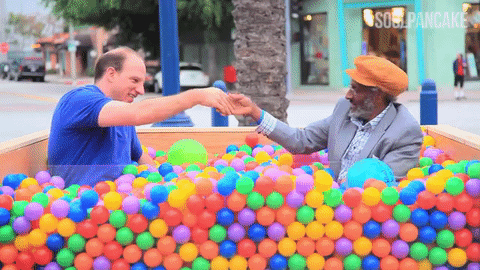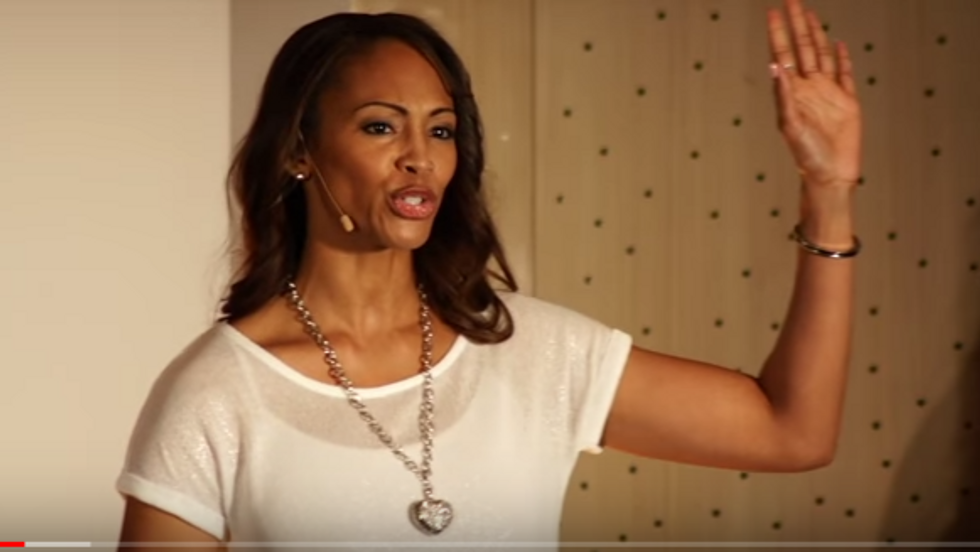TED Talks are the perfect balance between watching Netflix and procrastinating homework. By watching TED Talks, you are still learning, but are doing so in a way that helps you become a better person. The videos I selected are from a variety of topics like stress, happiness, love, and self-improvement. These are all major things that college students struggle with, and I believe that there are many tips within these videos that can increase the quality of life during the college years. I encourage you to watch these 25 TED Talks throughout December in order to jump into the new year and the second semester with new perspectives on your college life.
1. "How to Stop Screwing Yourself Over"

Mel Robbins urges you to turn off your autopilot and step out of your comfort zone.
2. "How to Stay Calm When You Know You'll be Stressed"

Daniel Levitin, a neurobiologist, explains how we can stay calmer when stressed by thinking ahead about what our failures might be, and figuring out a plan for them before they occur.
3. "How to Make Stress Your Friend"

Kelly McGonigal explains that seeing our stress as helpful instead of negative can increase not only your mental health but your physical health as well.
4. "Grit: The Power of Passion and Perseverance"

Angela Lee Duckworth left her demanding job in management consulting to teach in the New York City public schools. She soon realized that her strongest and smartest students didn't always get the best grades, but that they were capable of doing so if they worked hard at it. She then went to graduate school to become a psychologist and studied successful people in multiple occupations, and what made them successful. Those who reached the most success had grit.
5. "How to Get Better at the Things You Care About"

Eduardo Briceno suggests the idea of spending less time in the "performance zone" and more time in the "learning zone."
6. "Inside the Mind of a Master Procrastinator"

You have two weeks to write a paper, but you don't even start writing it until the night before it's due. You know that if you just wrote a little bit each day it wouldn't seem like a big deal, but it never works out that way. Tim Urban talks about the struggles of procrastination, like googling random thoughts for hours instead of doing anything productive, and urges you to think about what you are really procrastinating on.
7. "How to Gain Control of Your Free Time"

Laura Vanderkam offers advice on how to make more time with the time you have. Often when we say "I don't have time" we are actually saying "This is not important enough to me to find time for."
8. "The Brain Changing Benefits of Exercise"

Wendy Suzuki lists major benefits of exercise for the brain, like protection from depression, Alzheimer's, and dementia. Exercise doesn't always have to be going to the gym, going for a run, or playing a sport. Exercise can be as simple as going for a walk after dinner, walking to class instead of taking the bus or walking on breaks at work instead of sitting on your phone.
9. "Keep Your Goals to Yourself"

Often when we tell people our goal, we are instantly congratulated for simply saying it. This good feeling, according to Derek Sivers, makes us less likely to actually accomplish our goal, because our mind tricks itself into thinking we already did it. We all have the desire to tell our friends our goals so that they help us stick with it, but psychologically this isn't the best way to actually accomplish our goals.
10. "What Makes a Good Life"

When you think of what you want in life, money and fame are two of the main things that instantly pop up in your head. Robert Waldinger describes the results of a 75-year-old Harvard study on happiness to find out what truly makes a good life. What the study found, may be surprising. It is not money or fame, but something that is easy to obtain every day of your life.
11. "Measuring What Makes Life Worthwhile"

After watching the previous video on what makes life good, it's important to know what is not only good but what is worthwhile. Chip Conley explains how the activities that we do every day may not seem like amazing things to do, but what matters is the effect our activities have. For example, you might be working a part-time job at a restaurant or retail store and not find the job itself enjoyable, but you may find happiness in relationships with your coworkers and your customers.
12. "The Habits of Happiness"

Matthieu Ricard is a former biochemist, now Buddhist monk. He believes that we have the mental ability to generate happiness, rather than trying to find it in external goods such as money, fashionable clothes, or grand success.
13. "There's More to Life Than Being Happy"

Emily Esfahani Smith begins her talk by stating the following, "I used to think the whole purpose of life was pursuing happiness [...] I searched for that ideal job, perfect boyfriend, beautiful apartment, but instead of ever feeling fulfilled, I felt anxious and adrift." Does this sound familiar? If you've spent your whole life searching for happiness but are left feeling empty, it may be due to having a lack of meaning in your life. Okay, well how do I find meaning? Watch Emily's video and find out.
14. "You Aren't At the Mercy of Your Emotions"

I really love this talk by Lisa Feldman Barrett, because it completely changed how I think about my emotions. She explains how our emotions are actually "guesses" and those emotions are not hardwired into our brains. "Emotions are not built into your brain at birth, they are just built."
15. "The Power of Vulnerability"

Brené Brown talks about how shame is the fear of disconnection. We are afraid of people seeing who we really are, and then not like us because of it. This shame makes us vulnerable, afraid to open up, afraid to be unwanted, afraid to be hurt. Brené claims that we can find power in our vulnerability instead of shame.
16. "Asking for Help is a Strength Not a Weakness"

Michele L Sullivan: "The only shoes you can walk in are your own [but] with compassion, courage, and understanding, we can walk together, side by side." I love this quote because it's true that no one can live our lives for us, but it's also true that we're never really alone. There are ALWAYS people who are there to help when you need it, and you shouldn't think less of yourself for needing someone by your side.
17. "How to Fix a Broken Heart"

Guy Winch, a psychologist, offers advice on how to move on after getting your heart broken. Almost all of us have experienced heartbreak, and when it's happening you feel like it'll never end-- but it does with time.
18. "A Better Way to Talk About Love"

Mandy Len Catron encourages us to try and find more joy in love, and less suffering. Love is often talked about in terms of madness-- pain, anxiousness, jealousy, highs, and lows... you know how it goes. The truth is, love doesn't have to be madness. It doesn't have to be painful and messy. Mandy suggests "Reframing love as something I get to create with someone I admire."
19. "Compassion and the True Meaning of Empathy"

Joan Halifax works in hospice and on death row, so she has seen people in their last stages of life. Joan details what she has learned about compassion and empathy from these experiences.
20. "Why You Should Talk to Strangers"

Kio Stark encourages us to talk to strangers because it is an interruption into not only our expected daily lives but theirs as well. Talking to strangers about the weather, or even just saying "hi," may be empty words, but they aren't empty of meaning. When you say something to a stranger, you're acknowledging their existence. You never know what people are going through, and sometimes a simple smile or short comment can make them feel like they belong, or like they are not invisible. I could talk about this video forever because I absolutely love it.
21. "How to Disagree Productively and Find Common Ground"

"I don't like to talk about politics," is what you hear a lot of people say, especially about the 2016 presidential election. In many cases, the truth is that people know that talking about politics will only consist of each side defending their case without budging, and both sides just end up angry. Julia Dhar gives three ways to talk to each other differently, in order to disagree, but in a productive way, not an "I'm right and you're wrong" type of way.
22. "My Journey to Thank All the People Responsible For My Morning Coffee"

AJ Jacobs, an author, personally thanked over a thousand people-- the people who contributed to his morning coffee. For me, going to get coffee in the morning isn't always just about the coffee, it's about my little bit of happiness before I begin my day. I could easily make coffee in my Keurig, but I decide to go to coffee shops instead. That little bit of happiness that comes from buying a coffee is made possible by others, and so they are partially a factor in my happiness. AJ realized that he had taken those people for granted, and wanted them to know that he appreciated them.
23. "Why Some of Us Don't Have One True Calling"

Emilie Wapnick asks the audience, "How old were you when you were first asked, 'What do you want to be when you grow up?'" Some of us might quickly say astronaut, spy, doctor, teacher, etc., and some of us might not know. Not knowing doesn't mean you're not good at anything, most of the time not knowing means you have multiple interests and can't decide on one. Emilie reassures us that that's okay. It's okay to not be super good at one thing and put all of your time and effort into it.
24. "How to Find Work You Love"

Scott Dinsmore worked for a Fortune 500 company and expected it to be everything he ever wanted. He was wrong: "Within about two months I noticed at about 10 am every morning I had this strange urge to want to slam my head through the monitor of my computer." A job you love is a job in which you are able to make a positive and fulfilling impact. Scott explains that it's not about doing something grand like Gandhi or Steve Jobs, but it's about doing what matters to you. Watch the full video to learn how to find a job you love.
25. "The Happy Secret to Better Work"

Shawn Achor suggests that being happy at work can make us more productive.
All of these videos offer great self-help tips to turn you into the person you want to be. Make stress your friend, work on improving yourself mentally and physically, reflect on your life and make changes when necessary! You got this.

















